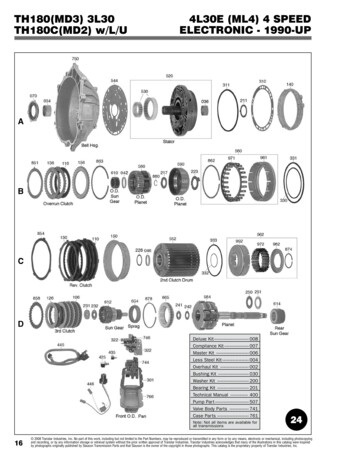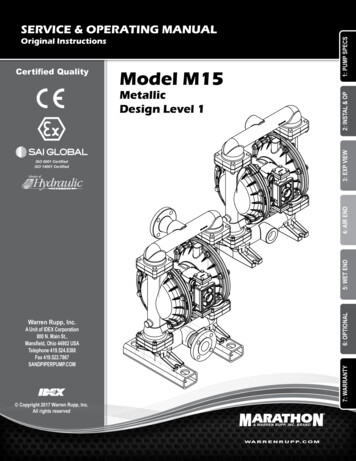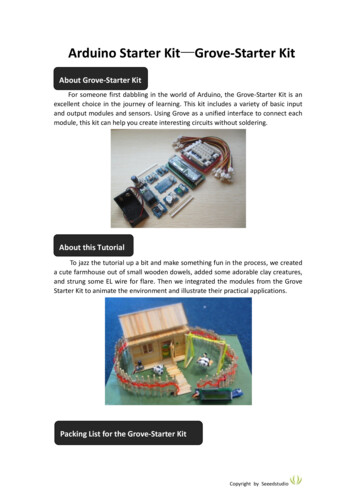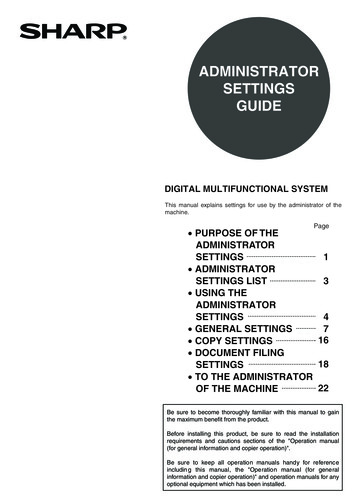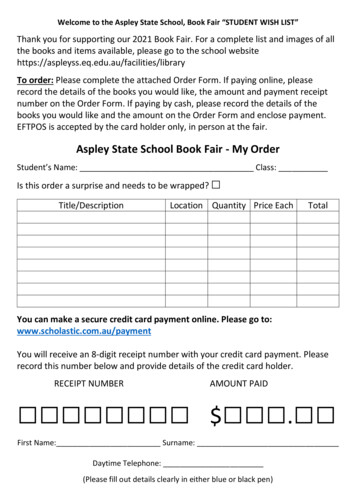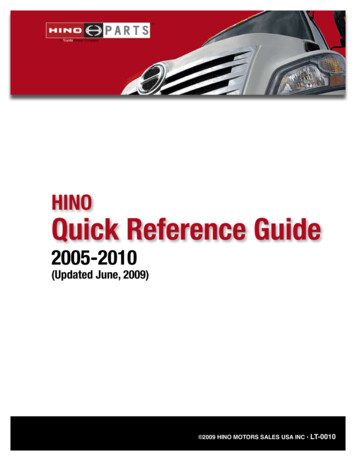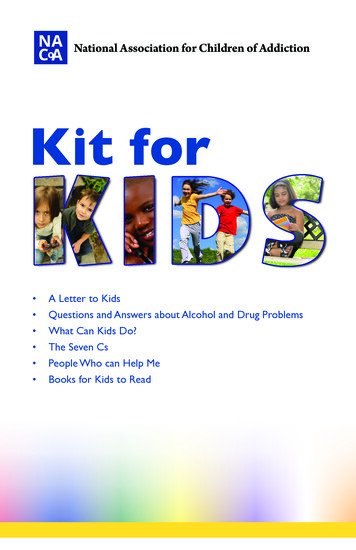
Transcription
National Association for Children of AddictionKit for A Letter to KidsQuestions and Answers about Alcohol and Drug Problems What Can Kids Do?The Seven CsPeople Who can Help MeBooks for Kids to Read
Copyright 2019. 9th EditionNational Association for Children of Addiction (NACoA)10920 Connecticut Ave, Suite 100Kensington, Maryland 208951-888-55-4COAS
Letter to KidsHello:I’ll bet you feel all alone when your mom or dad drinks too much or usesdrugs, because maybe you think that no one else’s mom or dad does that.Or maybe you think that no one knows how you feel. Do you know thatthere are plenty of kids your age who feel exactly like you, because theirparents drink too much? I know how you feel, because one of my parentssuffers from an alcohol or drug use disorder.It’s not easy. When I was your age, I felt so alone. Every time my parentstarted drinking, I had that funny feeling in my stomach that somethingwasn’t right. I was scared to tell anyone. I wondered why I had a parentwho drank so much.I always wondered if I did anything to make my parent drink. None of myfriends could spend the night at my house because I never knew when itwould start. I didn’t want my friends to know what went on in my house;besides, when my parent started to drink I never knew what would happen. I didn’t want anyone to know what a mess it was when the drinkingstarted. I felt ashamed, and I believed my house was REALLY differentfrom everybody else's.When I grew up I moved away from my confusing house, and I beganto meet other people who had alcoholic parents. I talked a lot to thesepeople about how it was in my house, and I didn’t feel embarrassed because they talked about what went on in their houses when their parentsstarted drinking. I realized that other people had the same kinds of confusing things happen to them.Some people came from homes that were more messed up than mine,and other people came from homes that didn’t have as many problems asmine did. Many thought their parents' drinking was their fault, even thoughit really wasn't. But I realized one thing: that all the time when I was a kid,when I thought I was alone and the only one with parents who drank toomuch, I WASN’T.Kit for Kids 1
You aren’t the only one with parents who drink too much or use drugs.There are a lot of us here.On the next page, I want to tell you some things about alcoholism that Iwish someone had told me when I was a kid. Maybe these things will helpyou understand a little bit better, and maybe you won’t blame yourself thenext time your parents drink too much or use drugs.Your Friend,An adult child of an alcoholic parent2 National Association for Children of Addiction
Fact Sheet Just For YouFact #l Addiction is a disease. Your parent is not a bad person; he or shehas a disease that makes him or her lose control when drinking or using otherdrugs. Alcohol and drugs do that; when you drink too much, or use drugs, youdo and say things that you normally wouldn’t. Maybe the disease makes them domean or stupid things that they would not do if they didn’t drink.Fact #2 You cannot control your parent’s drinking. It is not yourfault. Don’t hide the bottle or try to be perfect; you can’t do anything about yourparent’s drinking. You are not the reason why your parent drinks. You did notcause the disease.Fact #3 You are not alone. There are lots of kids just like you. I’ll bet thereare some in your class at school - kids you would never think of might have a parent who drinks or uses drugs like yours. Maybe you know some of them becauseyou’ve seen what goes on in their house. In fact, from all the surveys done in theUnited States, we know that about 1 out of 4 children in our country are livingwith addicted parents.You really aren’t alone.Fact #4 You CAN talk about the problem. Find someone you trustwho will talk to you. It could be a teacher, a friend’s parent, a big brother or sister,or someone else who will listen to you. These are the 'safe people' in your life.You can fill out the page in this booklet called "People Who Can Help Me". Justkeep this list with you so that you can call someone if you feel like talking.We alsohave a list of phone numbers here that you can call if you need someone to talkto or for help of any kind. The phone numbers are on a card that you can keep inyour bookbag or other safe place. These numbers are on the same page as yourpersonal list "People Who Can Help Me." All of the numbers are free; just dial1-800- and then the number. Also, there is a group for kids called "Alateen". Thisgroup has meetings, like a club, and the kids there share tips on how to make theirlives easier. Some schools have Alateen meetings on the school grounds duringthe day or after school. Maybe your teacher could help you find one. You can alsocall or visit Al-Anon (www.al-anon.org) on line to learn about Alateen meetings inyour area and to learn more about Alateen. Maybe a grownup you can trust willhelp you get to a meeting if transportation is a problem for you.Please don’t forget these four facts.Kit for Kids 3
Questions and Answers aboutDrug and Alcohol nswer:Question:Answer:Question:Answer:What is addiction?Addiction to alcohol or drugs is a brain disease. Peoplewho have the disease have lost control over their drinking and drug use and are not able to stop without help.They also lose control over how they act when they aredrinking or using drugs.How does addiction start?Doctors don’t know all the reasons why people becomeaddicted. Some start drinking a little bit or use drugs toforget problems or to calm their nerves, but then theyend up needing the alcohol or drugs to feel normal. Oncea person loses control over drinking or drug use, he orshe needs help to stop.If the alcoholic is sick why doesn’t he or she just go to thedoctor?At first the addicted person is not aware that he or she is ill.Addiction to alcohol or drugs is a disease of the brain thatconvinces people they don’t have it. Even when the personbecomes aware that something is wrong, he or she may notbelieve that drugs or alcohol is the problem. The personmight keep blaming things on other people, or might blametheir job, or the kids/family, or whatever. But, really, it’s thealcohol or drug use that’s the biggest problem.Is there an "average" alcoholic or drug addicted person?No, there is no such person. Alcohol or drug dependentpersons can be young, old, rich, poor, male, or female.What is the cure for addiction?There is no cure for addiction except stopping the disease by stopping the drinking and drug use. People addicted to alcohol or other drugs who have completelystopped are called “recovering.” Recovering persons canlead healthy, happy, productive lives.4 National Association for Children of Addiction
n family members make an addicted person stop drinking and using?No. It is important to know that an addicted personneeds special help to stop drinking or using drugs, butno one can be forced to accept the help, no matter whatyou do or how hard you try. It is important to know thatfamily members by themselves cannot provide the helpthat an addicted person needs. He or she needs the helpof people trained to treat the disease.How many children in the United States have at least onealcoholic or drug dependent parent?About 1 in 4 children under age 18 in our country aregrowing with at least one addicted parent. There areprobably a few in your class right now. And remembersome adults grew up with addicted parents too.I know I can’t make my addicted parent stop drinking orusing drugs, so what can I do to make myself feel better?Talk to someone you trust about the problem. Talk to ateacher, a Scout leader, a coach, a school counselor. Alsothere is a group for kids who have alcoholic parents called“Alateen.” Some parents are also using drugs. Alateen hasmeetings, like a club, and the kids share tips on how tomake life easier. You can reach Alateen on the internet atwww.al-anon.org for more information and meetings inyour community. Ask at school if there are any Alateengroups or school-sponsored support groups. Alateen isalso available on Facebook, Twitter and Instagram.Kit for Kids 5
What Can Kids Do?Here are a few suggestions for you when a parent drinks too much:DO talk about how you feel. You can talk with a safe person in your life maybe a close friend, relative, school counselor, teacher, minister, or others.Sharing your feelings is not being mean to your family. Talking to someoneabout your feelings can help you feel less alone.DO try to get involved in doing enjoyable things at school or near whereyou live - the school band, softball, Boy or Girl Scouts, or other fun activities.Doing these types of things can help you forget about the problems at home,and you could learn new things about yourself and about how other peoplelive their lives.DO remember that feeling afraid and alone is a normal way to feel when youlive with addicted parents. It’s confusing to hate the disease of addiction atthe same time that you love your alcoholic parent. All people have confusingfeelings: two different feelings at the same time. This is the way many kids feelabout alcoholic parents.DO remember to have fun! Sometimes children with alcoholic families worry so much that they forget how to be “just a kid.” If things are bad at home,you might not have anyone who will help you have fun, but don’t let that stopyou. Find a way to let yourself have fun.DON’T ride in a car when the driver has been drinking if you can avoid it.It is not safe. Walk or try to get a ride with an adult friend who has not beendrinking. If your parents are going out to drink somewhere, try not to go withthem. If you must get in a car with a drinking driver, sit in the back seat in themiddle. Lock your door. Put all your stuff on the floor. Put on your seat belt.Remain calm.DON’T think that because your parent drinks too much that you will be introuble with alcohol too when you get older. Remember, if you don't drink oruse drugs, you can't get this disease.DON’T pour out or try to water down your parent’s alcohol. The plain factis that it won’t work. You have no control over the drinking. You didn’t makethe problem start, and you can’t make it stop. It is up to your parent to gethelp. What your parent does is not your responsibility or your fault.6 National Association for Children of Addiction
REMEMBER the Seven Csbut Jerry Moe, MANational Association for Children of Addiction10920 Connecticut Ave, Suite 100, Kensington, MD 20895 nacoa.orgKit for Kids 7
People Who Can Help MeName Phone NumberCut out this card and keep it in a place whereyou can get to it easily, like in your bookbag,pencil case, or in with collector cards.Phone Numbers for Kids to CallIf They Need HelpBoystown National Hotline800.448.3000TDD line (1-800-448-1833).Translation services availableText VOICE to 20121. To chat onlineor email: www.yourlifeyourvoice.orgCHILDHELP USA National Helpline 800.422.4453Crisis Call Center800-273-8255Text HELLO to 741741Message at:facebook.com/CrisisTextLineSuicide Hotline:800-784-2433Text ANSWER to 839863National Runaway Safeline1.800.786.2929To chat online or email:www.1800runaway.org8 National Association for Children of Addiction
Books for Kids to ReadYou can take this list to the library, and ask the librarian if they have any ofthese books. If they haven’t, you might ask if they are at another library. If theyare, sometimes the librarian can get an “inter-library” loan for you. Someof these books can be purchased through online book distributors. You canfind more books, booklets and pamphlets especially for you by visiting www.alateen.orgAlateen-Hope for Children of Alcoholics. Virginia Beach, VA: Al-Anon FamilyGroup Headquarters, Inc. www.alateen.orgThe Beamer Series. Tom Drennon and Jerry Moe. Rancho Mirage, California: Betty Ford Center, 2008. Beamer faces many challenges due to addiction in his family. In this series of four booklets, each containing threechapters, Beamer learns that he’s not alone and addiction is not his fault.www.hazeldenbettyford.orgBottles Break. Nancy María Grande Tabor.Watertown, MA: Charlesbridge Publishing, 1999. This book is about parents who are absorbed in drinking andhow the young narrator feels about it. Included are helpful web sites, addresses and phone numbers. Also available in Spanish, Botellas Se Rompen.Emmy’s Question. Jeannine Auth. St.Augustine, Florida: Morningtide Press, 2007.This is the powerful story of a young girl’s struggle with parental alcoholism.Kids’ Power Too! Words To Grow By. Cathey Brown, Elizabeth D’Angelo LaPorteand Jerry Moe. Dallas, TX: Imagin Works. 2010. A book of daily affirmations tohelp children, one day at a time, to face life’s daily challenges in a healthy andbalanced way.My Dad Loves Me, My Dad has a Disease. Claudia Black. Bainbridge Island, WA:MAC. Revised 3rd Edition, 2012. A workbook designed to help young childrenlearn about themselves, their feelings, and the disease of alcoholism in theirfamilies through art therapy. Children between the ages of six and fourteenshare what it is like for them to live in an alcoholic family.Think of Wind. Catherine Mercury. Rochester, NY: One Big Press, 1996. Abook about how it feels for a child living with alcoholism in the family.Kit for Kids 9
Internet Addresses That CanHelp YouAlateenwww.al-anon.orgNational Association for Children of Addictionwww.nacoa.org
persons can be young, old, rich, poor, male, or female. Question: What is the cure for addiction? Answer: There is no cure for addiction except stopping the dis-ease by stopping the drinking and drug use. People ad-dicted to alcohol or other drugs who have completely stopped are called "recovering." Recovering persons can

